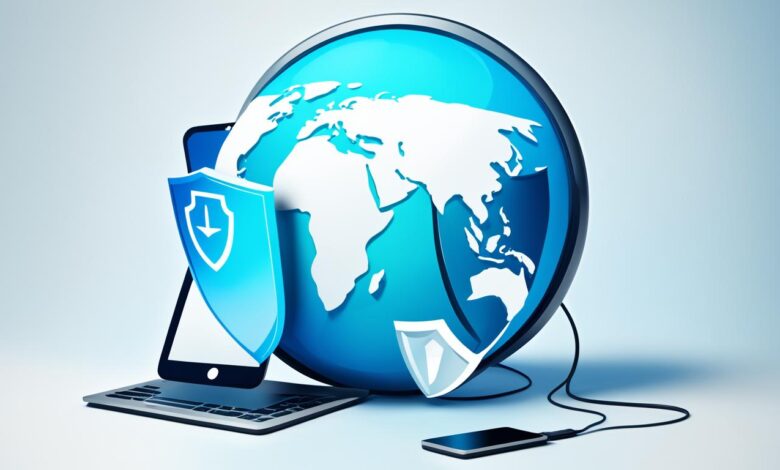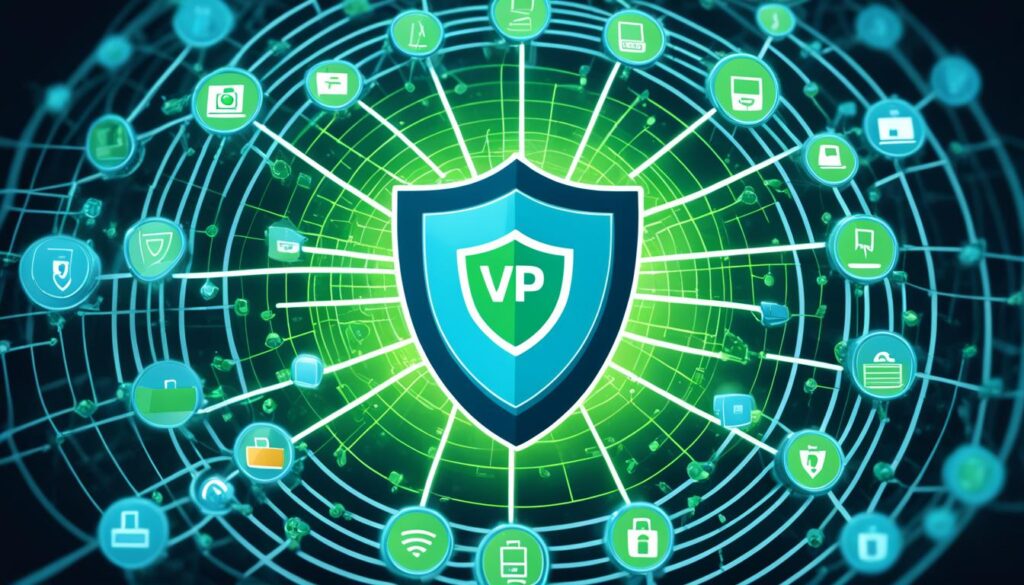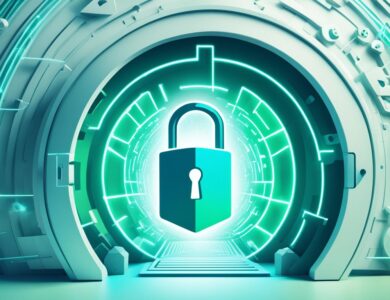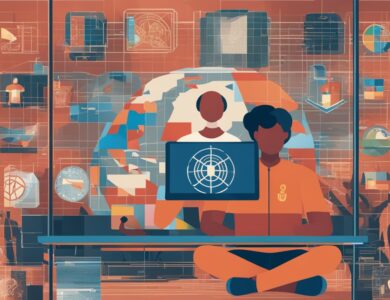
A VPN, or Virtual Private Network, shields your internet use with a secure tunnel. This tunnel guards your data from cyber threats. It’s vital in today’s world where cyberattacks are common.
Your data is encrypted, meaning it’s hidden from prying eyes. Your IP address is also hidden, ensuring you can browse the web anonymously. Plus, a VPN protects your data from being stolen while you’re online.
In the early 2000s, VPNs were mainly for company use. Now, they’re for everyone, expanding to personal use worldwide1. From 2016 to 2018, the global number of VPN users skyrocketed1. In places like Thailand and China, where the web is restricted, one in five internet users uses a VPN1. The trend has caught on in the USA, UK, and Germany too, with 5% of users employing them1.
Today’s VPNs deploy top-notch encryption like the 256-bit AES for maximum security2. They use OpenVPN, a leading industry protocol for its safety and flexibility2. With these technologies, VPNs keep your online activities private. They also make using public networks safer and enable secure access to company networks from anywhere.
Key Takeaways
- VPNs offer a secure tunnel for internet or private network access, ensuring online privacy.
- The number of VPN users worldwide increased more than fourfold between 2016 and 20181.
- In restrictive regions, one in five internet users leverage VPNs to circumvent censorship1.
- Modern VPNs employ 256-bit AES encryption and protocols like OpenVPN for enhanced security2.
- VPNs are essential tools for safeguarding sensitive information against sophisticated cyberattacks.
- They have broad applications, from ensuring online privacy to secure, remote access to corporate networks.
Introduction to VPNs
VPNs are key for digital privacy and cybersecurity. They create safe networks over the web. VPNs use powerful encryption to keep data private. This is vital for businesses and anyone needing secure online access3.
These secure systems ensure that what you send online is hidden. They help with making the internet safer. This process means data is kept secret, verified, and protected during transmission.Internet safety gets a big boost3.
VPNs support different protocols like IPSec and OpenVPN. They use strong encryption like 256-bit AES to keep things secure2. VPNs help private networks talk safely over the internet. This creates a shielded connection over the web’s open paths3.
Using a VPN hides your online movements from your internet provider and others. It protects your digital privacy and internet safety. SSL VPNs are user-friendly and work on most networks. They allow secure remote access from anywhere3.
VPNs are more than just security. They let you work safely from any spot, free from spying. This improves how you do things online, whether at home or work.
History and Evolution of VPNs
Learning about VPNs involves looking into key moments, improvements, and their rise in both business and personal use.
The Origin of VPNs
The idea behind VPNs began with the need for safe online talk. In the late 1960s, ARPANET connected far-off computers. This was the start of today’s internet45. By the 1980s, TCP/IP became the go-to for making various devices work together45. At the same time, the Domain Name System (DNS) was made. It made getting to websites easier by turning domain names into numbers called IP addresses45. These steps were key in making the web more secure.
Major Milestones in VPN Development
In 1989, “The World” started offering internet service, letting people go online via dial-up45. Soon after, in the early 1990s, IP encryption tech arrived, setting a strong base for VPNs. By the mid-1990s, things like IPsec and PPTP were adding security by scrambling data45. Cisco’s L2F then made these methods better. They even teamed up with Microsoft to create L2TP4. These moves were big for VPN progress.
With cybercrimes on the rise in the early 2000s, businesses began to use VPNs more for better online security4. In 2005, the first VPNs made for everyday use showed up, making setup easier4. In the late 2010s, WireGuard appeared, known for its great way of keeping data safe4. Then, SD-WAN and SASE got more popular, giving businesses flexible ways to stay connected4. VPNs kept getting better to handle more cyber threats.
Adoption by Businesses and Individuals
The COVID-19 pandemic from 2020 showed how much we need VPNs for remote work4. During this time, companies made their servers stronger, started using more than one way to check users are really who they say they are, and added malware spotting tools to stay safe online4. Even with a few setup issues, VPNs are key for private and secure talks online4. Today, VPNs help not just big companies but also people who want more online safety and privacy.
How VPNs Work
It’s important to know how VPNs keep your online life safe and private. They use special technology and rules to do this. Without these, your data would not be as safe.
Encryption Protocols
VPN encryption turns your data into a secret code. This makes it safe from others. Technologies such as OpenVPN and IPsec are key. They ensure your information stays totally secure6.
Advanced encryption keeps you safe from online threats. It makes sure your data looks like gibberish to anyone trying to steal it.
Tunneling
Creating a secure tunnel for data is vital in the world of VPNs. Technologies like PPTP and SSTP are used for this. They shield your information as it moves through the internet6.
Think of this as putting your data in a strong, invisible box. It travels safely through the online world, away from prying eyes.
Authentication Methods
Only the right people should be able to use a VPN. To make this happen, special checks are in place. These include using secret codes and passwords. OpenVPN mixes different ways to check who is allowed in6.
This is like making sure only your friends can enter your secret club. It keeps the VPN safe from unwanted visitors.
IP Address Masking
A VPN hides your true online identity. Instead of showing who you really are, it shows who the VPN server is. This makes tracking what you do online very hard for others. Keeping your real identity hidden has become a big reason why people use VPNs around the world1.
It’s like wearing a mask at a party. You can have fun without worrying about someone recognizing you.
DNS Resolution
VPNs also take care of some important internet lookups. This keeps your searching private and safe from any leaks. Good DNS handling is crucial for you to have a smooth and worry-free time online6.
Imagine a friend who always guides you in the right direction. That’s what VPNs do for your internet searches, making sure they are safe and private.
Types of VPNs
Virtual Private Networks (VPNs) are split into categories by use. Knowing the difference between Corporate VPNs and Personal ones is key. There are also Remote Access VPNs and Site-to-Site VPNs. This knowledge helps in picking the right one for business or personal use.
Corporate VPNs vs. Personal VPNs
Corporate VPNs keep business data safe. They allow safe access to a company’s network for remote employees. This keeps the company’s info safe. On the flip side, Personal VPNs focus on privacy and online safety. They hide IP addresses and encrypt online actions. Personal VPNs are often used to bypass geo-restrictions.
Remote Access VPNs
Remote Access VPNs let users connect to their work’s network from afar. They are great for off-site workers who need to reach company resources securely. Methods like OpenVPN or IPSec create a secure link between the user’s device and the company’s network78. Companies can use services like Amazon Web Services and Microsoft Azure to set up these VPNs. This helps make working away from the office safe and smooth with Business VPN Solutions.
Site-to-Site VPNs
Site-to-Site VPNs make secure links between different networks, perfect for companies with many offices. It works like creating one big network that’s always connected and secure7. They use protocols like L2TP and IPSec to ensure robust security. This makes them good for bigger business tasks that need a stable VPN link.

There are many VPN options, each with its advantages. Learning about each can guide you to the best choice. Whatever your needs are, from business to personal, choosing the right VPN leads to more secure online actions and steady VPN service.
What is VPN: The Basics Explained
A Virtual Private Network (VPN) is an important tech tool. It secures your connections through encrypted tunnels. These tunnels can be over public or private networks, focusing on keeping the network safe and private.
Definition of VPN
Think of a VPN as a cloak for your internet use. It hides your IP address and scrambles your online activity. This security makes it hard for others to see what you’re doing online.
Key Components of VPNs
VPNs use top-notch security tools like encryption standards and authentication methods. For instance, OpenVPN is popular because it’s secure and transparent, making it harder for prying eyes to view your data2.
There’s been a big rise in VPN use from 2016 to 2018, going up four times1. People want secure online activities and like using VPNs to watch shows on Netflix from anywhere1. In some places where the internet is limited, like Thailand, Indonesia, and China, one out of every five users depends on a VPN1.
For big companies, VPNs are crucial for safe communication between different sites1. They became even more important during the pandemic. SSL VPNs helped workers connect to their office networks from home, keeping businesses running smoothly1.
Advantages of Using a VPN
VPNs bring many benefits for safer data transfers and more online freedom. One key plus is keeping your personal data safe with strong 256-bit encryption. It stops others from seeing your sensitive info, keeping your privacy safe and sound910. This kind of protection is crucial for both people and companies to keep their secrets.
For companies, using a VPN makes it easy to let more people connect securely at once. This is perfect for employees working from home or while away. No need for lots of IT workers or big staff costs is a big plus910. It also saves money on keeping the network safe and up to date9.
People love VPNs because they can watch shows or visit sites not usually available in their area. This keeps online choices and rights free. VPNs also stop your online moves from being tracked, keeping your web browsing private9. They can even help you bypass any slowdowns your internet provider tries to put on you, keeping your connection fast and open910.

Changing your IP address with a VPN can make deals on flights and rentals easier to get. This shows how using a VPN can save you money, starting at just $3.50 monthly. It covers your privacy and ensures a secure connection without being too expensive9. Plus, VPNs are legal and widespread, though some countries might limit them11.
With the need for more secure online actions, VPNs are becoming more popular. By 2023, over half of internet users worldwide used a VPN to stay private on shared Wi-Fi11. This shows how much people trust and need the benefits VPNs bring wherever they are.
Common Use Cases for VPNs
VPNs are used widely and for many reasons. They help keep your online activities private. They’re also used by businesses for safe remote work and to get around online restrictions. Let’s take a closer look at how they’re used.
Ensuring Online Privacy
VPNs are key for keeping your online life private. They hide your activity, making it hard for others to snoop. This includes ISPs, ad companies, and hackers. 81% of Americans use public Wi-Fi, but only 1% use a VPN. This gap shows the need for better online privacy protection12.
VPNs are especially important when you use public Wi-Fi. They secure your data on these networks. This is why they’re so important for keeping your info to yourself.
Securing Remote Work
For companies, VPNs are a must for safe remote access. They keep business information secure while letting employees work from anywhere. Remote work is on the rise, making VPNs a standard tool for secure work access13.
VPNs also stop internet providers from slowing your connection. This means a smooth work experience no matter where you are12.
Bypassing Geo-Restrictions
VPNs are not just for work; they’re essential for getting around online limits. They let users in restricted areas browse freely. This is great for journalists and activists facing digital roadblocks13.
They also let users unlock blocked content. This means you can see global info and entertainment. For example, NordVPN can help travelers find cheaper vacations by changing where they appear to be browsing from12.
VPNs are more than tools for privacy or work access. They’re essential in today’s digital world. They help in many ways, showing how they fit into our personal and business security plans.
Choosing the Right VPN Service
Looking for a VPN? It’s key to check their privacy rules, trust, and how they protect your data. A good VPN will use strong encryption, like the AES 256-bit key. This is trusted by cyber experts and many governments to keep your information private14. Make sure the VPN doesn’t keep track of your online actions for true anonymity14.
The features a VPN comes with are important too. Top VPNs use OpenVPN and WireGuard for secure connections. Look for a Kill Switch in their features list. It keeps you safe by cutting off the internet if the VPN falls out. Some VPNs also look out for dangers online, stopping harmful files from getting to your devices14.
VPNs like NordVPN, ProtonVPN, and Surfshark VPN are known for doing well in tests and for being safe15. They often have outside experts check their security and privacy practices, ensuring they’re top-notch14. It’s also cool if a VPN lets you protect many devices at once, or even all of them in a big family1416.
Don’t forget about speed. The fastest VPNs slow down your internet by 20% or less, making them good for things like watching 4K videos or playing games16. If you’re just browsing, you might be fine with a VPN that’s a little slower, up to 50%16.
Also, a good VPN will have servers all over the world. This lets you pick different places online to seem like you’re there, which is great if you want to watch shows only available in certain countries1416. When picking a VPN, aim for strong encryption, no logs, protection from DNS leaks, and a simple setup. These features help you choose a VPN you can trust1416.
| VPN Provider | Rating | Key Features |
|---|---|---|
| NordVPN | 4.5 Outstanding | 256-bit encryption, no-logs, independent audits, Kill Switch |
| ProtonVPN | 5.0 Exemplary | High-speed, strict no-logs, free option available, threat protection |
| Surfshark VPN | 4.0 Excellent | Unlimited connections, 256-bit encryption, budget-friendly |
By following these guidelines and carefully considering your needs, you can make an informed choice when selecting a VPN service, ensuring both security and convenience.
Potential Drawbacks and Considerations
VPNs have great benefits but come with some downsides. One big issue is they can slow your internet down. This is because they use up some of your internet space to keep your connection safe17. However, top VPN services, like NordVPN, work hard to keep these slow-downs to a minimum11.
Some websites use software to block VPNs. This can be a problem, especially if you need to sign up for a website that checks your location17. If you want to browse securely and privately, choose a VPN that can get around these blocks.
It’s not always easy to set up a VPN. You must set it up right to avoid any leaks in your information17. It’s important to get the setup just right for better safety. Also, your VPN connection might fail sometimes, showing your online actions without privacy17.
If you love gaming, VPNs might not be for you. They can slow your speed down too much for gaming. It could even make some games impossible to play17. Think hard about whether these issues balance out the benefits of privacy and security.
While many good VPNs aren’t too expensive, free ones often lack safety features and fast servers. Using a free VPN might expose your data and make your internet slow because too many people are using the same server11.
Remember, VPN use might not be legal everywhere. Some places might not let you use them. And, some devices might not work well with VPNs unless you set up a special router at home. This can help protect all your gadgets11.
| Potential Drawback | Description | Impact |
|---|---|---|
| Internet Speed Reduction | Encryption can slow down connection speeds | Varies by VPN provider17 |
| VPN Blocking | Some websites block VPN access | Consequential for accessing content securely17 |
| Complex Setup | Proper configuration is required to prevent data leaks | Critical for ensuring effective data security17 |
| Dropped Connections | Reveals actual network information upon disconnection | Compromises online activities visibility17 |
| Gaming Issues | Reduced speeds affect gaming performance | Impacts user experience with limited bandwidth17 |
| Cost and Security of Free Services | Free VPNs may lack adequate security and infrastructure | Causes data leaks and slower speeds due to weak encryption11 |
| Legal and Compatibility Concerns | Compliance with regulations and device compatibility issues | Critical for effective deployment and use11 |
Conclusion
In our digital era, VPNs play a huge role in keeping our online activities safe. They started in the 1990s for business but are now widely used. VPNs make our internet traffic secret and hide our real location. This way, they help guard against online dangers and let us visit websites that are normally blocked18. The number of people using VPNs went up a lot between 2016 and 2018, growing by more than four times1.
In certain places like Thailand, Indonesia, and China, where the internet is limited, many people use VPNs. Around 20% of their internet users have one. But even in more open places such as the USA, the United Kingdom, and Germany, VPN use is increasing. Here, about 5% of internet users have started using VPNs1. This growth is due to more interest in secret content and more online dangers and hacks118.
It’s now more important than ever to know about VPNs. They protect your data and hide where you’re really connecting from. This is good for both companies and people who want to stay safe and free online. With the rise of remote work, VPNs have become essential for keeping our online life private and secure19.
FAQ
What is a Virtual Private Network (VPN)?
How does a VPN enhance online privacy?
What are the main types of VPNs?
What are the key components of VPNs?
How do VPNs secure remote work?
Are there any drawbacks to using a VPN?
What should I consider when choosing a VPN service?
Can VPNs help bypass geo-restrictions?
How have VPNs evolved over time?
What is the importance of encryption protocols in VPNs?
Can using a VPN save on corporate communication expenses?
Source Links
- https://www.kaspersky.com/resource-center/definitions/what-is-a-vpn
- https://azure.microsoft.com/en-us/resources/cloud-computing-dictionary/what-is-vpn
- https://networklessons.com/cisco/ccna-routing-switching-icnd2-200-105/introduction-to-vpns
- https://www.paloaltonetworks.com/cyberpedia/history-of-vpn
- https://nordvpn.com/blog/history-of-vpn/
- https://www.fortinet.com/resources/cyberglossary/how-does-vpn-work
- https://www.geeksforgeeks.org/types-of-virtual-private-network-vpn-and-its-protocols/
- https://nordlayer.com/learn/vpn/types-and-protocols/
- https://www.mcafee.com/learn/top-10-benefits-of-a-vpn/
- https://www.fortinet.com/resources/cyberglossary/benefits-of-vpn
- https://nordvpn.com/blog/benefits-of-vpn/
- https://nordvpn.com/blog/interesting-vpn-uses/
- https://www.mushroomnetworks.com/blog/vpn-virtual-private-networks-use-cases/
- https://nordvpn.com/blog/how-to-choose-a-vpn/
- https://www.pcmag.com/how-to/what-is-a-vpn-and-why-you-need-one
- https://www.cnet.com/tech/services-and-software/best-vpn/
- https://www.cdw.com/content/cdw/en/articles/security/advantages-and-disadvantages-of-vpn.html
- https://www.apporto.com/what-is-vpn
- https://cyberpanel.net/blog/what-is-a-vpn-and-how-does-it-work

